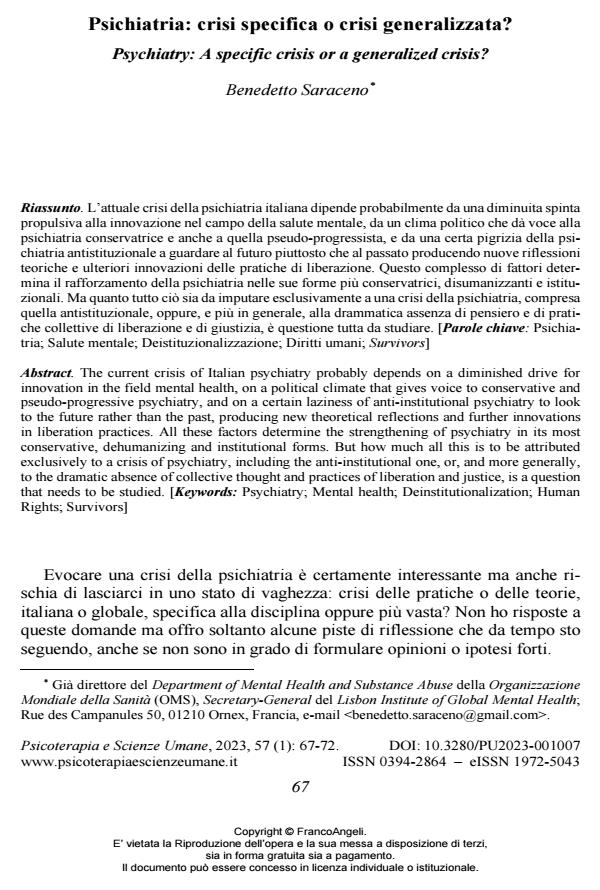Psychiatry: A specific crisis or a generalized crisis?
Journal title PSICOTERAPIA E SCIENZE UMANE
Author/s Benedetto Saraceno
Publishing Year 2023 Issue 2023/1
Language Italian Pages 6 P. 67-72 File size 94 KB
DOI 10.3280/PU2023-001007
DOI is like a bar code for intellectual property: to have more infomation
click here
Below, you can see the article first page
If you want to buy this article in PDF format, you can do it, following the instructions to buy download credits

FrancoAngeli is member of Publishers International Linking Association, Inc (PILA), a not-for-profit association which run the CrossRef service enabling links to and from online scholarly content.
The current crisis of Italian psychiatry probably depends on a diminished drive for innovation in the field mental health, on a political climate that gives voice to conservative and pseudo-progressive psychiatry, and on a certain laziness of anti-institutional psychiatry to look to the fu-ture rather than the past, producing new theoretical reflections and further innovations in liberation practices. All these factors determine the strengthening of psychiatry in its most conservative, dehumanizing and institutional forms. But how much all this is to be attributed exclusively to a crisis of psychiatry, including the anti-institutional one, or, and more generally, to the dramatic absence of collective thought and practices of liberation and justice, is a question that needs to be studied.
Keywords: Psychiatry; Mental health; Deinstitutionalization; Human Rights; Survivors
- Borgna E. (2022a). Agonia della psichiatria. Milano: Feltrinelli.
- Borgna E. (2022b). La psichiatria italiana, oggi. Psicoterapia e Scienze Umane, 56, 4: 565-570. DOI: 10.3280/PU2022-004003
- Morrison L.J. (2005). Talking Back to Psychiatry. The Psychiatric Consumer/Survivor/Ex-Patient Movement. London: Routledge.
- Ongaro Basaglia F. & Basaglia F. (1979). Follia/Delirio. In: Enciclopedia Einaudi, Vol. VI. Torino: Einaudi, 1979, pp. 262-287. Anche in: Ongaro Basaglia F., Salute/malattia. Le parole della medicina (“Collana 180. Archivio critico della salute mentale”, diretta da Peppe Dell’Acqua con la consulenza di Pier Aldo Rovatti). A cura di Maria Grazia Giannichedda. Merano (BZ): Alphabeta Verlag, 2012, pp. 119-114.
- Patel V., Saraceno B. & Kleinman A. (2006). Beyond evidence: the moral case for international mental health. American Journal of Psychiatry, 163, 8: 1312-1315.
- Saraceno B. (2012). La “distorsion anglaise”: remarques sur la réception de la pensée de Franco Basaglia. Les Temps Modernes, 668, 2: 55-63.
- United Nations (Department of Economic and Social Affairs, Disability) (2006). Convention on the Rights of Persons with Disabilities (CRPD). New York: United Nations -- (https://treaties.un.org/Pages/ViewDetails.aspx?src=TREATY&mtdsg_no=IV-15&chapter=4&clang=_en).
- Saraceno B. (2017). Sulla povertà della psichiatria. Roma: Derive e Approdi.
Benedetto Saraceno, Psichiatria: crisi specifica o crisi generalizzata? in "PSICOTERAPIA E SCIENZE UMANE" 1/2023, pp 67-72, DOI: 10.3280/PU2023-001007